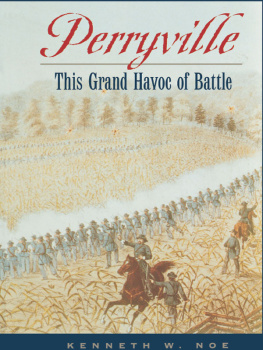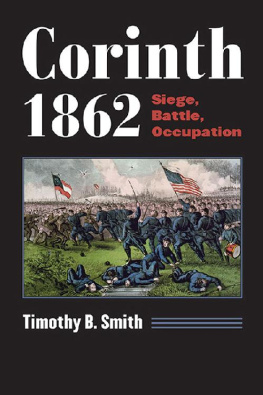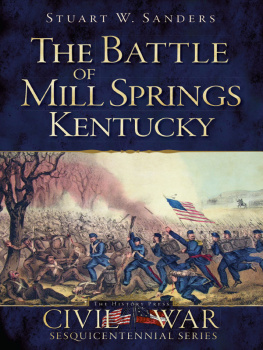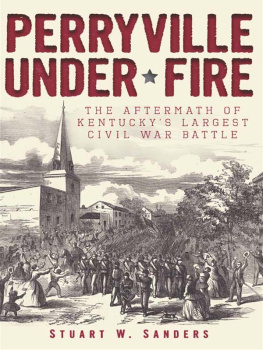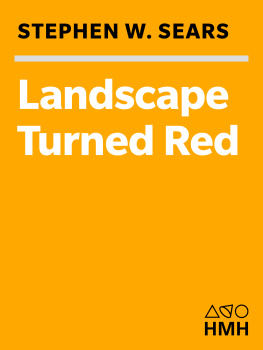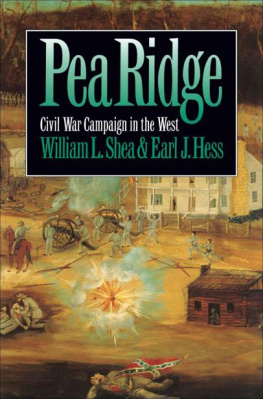P ERRYVILLE
THIS GRAND HAVOC OF BATTLE
KENNETH W. NOE
THE UNIVERSITY PRESS OF KENTUCKY
Publication of this volume was made possible in part by a grant from the National Endowment for the Humanities.
Copyright 2001 by The University Press of Kentucky Paperback edition 2011
Scholarly publisher for the Commonwealth, serving Bellarmine University, Berea College, Centre College of Kentucky, Eastern Kentucky University, The Filson Historical Society, Georgetown College, Kentucky Historical Society, Kentucky State University, Morehead State University, Murray State University, Northern Kentucky University, Transylvania University, University of Kentucky, University of Louisville, and Western Kentucky University.
All rights reserved.
Editorial and Sales Offices: The University Press of Kentucky 663 South Limestone Street, Lexington, Kentucky 40508-4008 www.kentuckypress.com
11 12 13 14 15 5 4 3 2 1
The Library of Congress has catalogued the hardcover edition as follows:
Noe, Kenneth W., 1957
Perryville : this grand havoc of battle / Kenneth W. Noe.
p. cm.
Includes bibliographical references and index.
ISBN 0-8131-2209-0 (alk. paper)
1. Perryville (Ky.), Battle of, 1862.I. Title.
E474.39.N642000
973.733dc21 00-012285
ISBN 978-0-8131-2209-0 (hardcover: alk. paper)
ISBN 978-0-8131-3384-3 (pbk.: alk. paper)
eISBN 978-0-8131-2623-4
This book is printed on acid-free recycled paper meeting
the requirements of the American National Standard for Permanence in Paper for Printed Library Materials.

Manufactured in the United States of America.

Member of the Association of
American University Presses
FOR NANCY
C 0NTENTS
I LLUSTRATIONS
M APS
P REFACE
On October 8, 1862, a hot and exceedingly dry day, Union and Confederate forces clashed in the Chaplin Hills just west of Perryville, Kentucky, a small market town located southwest of Lexington in the commonwealths central bluegrass. The climax of a hard, six-week campaign that reversed dwindling Confederate fortunes in the western theater and shifted the focus of the western war from northern Mississippi toward the Ohio River, the battle ended inconclusively. Although a Confederate tactical victory, Gen. Braxton Bragg abandoned the hard-won field to his numerically stronger foe and commenced a retreat that eventually led back to Middle Tennessee and the Battle of Murfreesboro. Although the Souths dream of adding Kentucky to the Confederacy did not die, the last realistic hopes of accomplishing it faded with Braggs retreat.
In the memories of the men who fought there that day, two attributes would at least to a degree forever distinguish Perryville from other battles. Sheer confusion at all levels was one. Erroneously convinced that most of Maj. Gen. Don Carlos Buells Army of the Ohio lay elsewhere, Bragg hastily and unwisely committed his army to battle without accurate intelligence of enemy strength. His lieutenants improvised thereafter, with varying results. In the end, Bragg certainly was lucky to escape with his outgunned army. Across the lines, Buell awoke that morning with a better grasp of the overall tactical situation, but because of a variety of factorsmost notably an unusual atmospheric phenomenon called acoustic shadowhe did not learn of the battle until it was over. As a result, more than half of his force stood by idly while the rest fought for its life. The coming of night and sheer dogged courage more than any obvious leadership saved the Federal army at Perryville. Not surprisingly, a chorus of condemnation for both generals followed the fight for their perceived mismanagement and dereliction, and harsh words pursued the two commanding generals to their dying days. According to one embittered Perryville combatant, Perryville was simply a useless slaughter, without special result to either combatant.1
With little good to remember about the disgraced higher-ups, many Perryville veterans claimed the lions share of the glory for themselves. Much credit is due to all the officers and soldiers of the regiment for their courage and coolness under a terrible fire of musketry and artillery; reported Col. Alfred R. Chapin of the 10th Wisconsin Infantry, but to the soldiers in the ranks is the most credit due, as the nature of the fight was such as to require no military science, but simply brave men.2 But if Perryville was confusing, a soldiers battle remarkable for its relative lack of direction and result, it also was singular for its sheer savagery. Chapin was right; there was nothing scientific about the fighting at Perryville, which at moments erupted in blood splattered hand-to-hand melees of clubbed muskets and bayonets. Veterans of the bloodbath at Shiloh routinely described Perryville as the more ferocious fight. Indeed, some considered it the most violent clash of the entire war. The ubiquitous Confederate infantryman Sam Watkins remembered Perryville, where he fought hand-to-hand for control of a Federal battery, as this grand havoc of battle and swore that he never experienced anything else like it. I was in every battle, skirmish and match that was made by the First Tennessee regiment during the war, he recorded in his memoir, and I do not remember a harder contest and more evenly fought battle than that of Perryville.... Both sides claimed victoryboth whipped.... Such obstinate fighting I never had seen before or since.3
Like Watkins, the other men who fought at Perryville could not forget it. Other Americans, however, displayed more selective memory in the years that followed. A Federal trooper who fought at Perryville, Capt. Marshall Thatcher of the 2nd Michigan Cavalry, could complain a mere twenty years later that the American public had shamefully forgotten the sacrifices made there, if they ever paid much attention in the first place. The battle of Perryville has never been fully understood by the general public, he lamented. It has been treated by newspaper historians as a mere skirmish. How many are there that ever knew that nearly 10,000 men were either killed or wounded, and that the struggle was almost continuous either on the right or left, and often at both wings, from sunrise until long after dark? Fourteen hours of fire and smoke, with lead and iron hail, deserves more than a contemptuous notice.4
Yet that is exactly what the Battle of Perryville continued to receive. How the public could treat Perryville as an affair of lesser importance so soon after its bloody occurrence says much about how the nation chose to remember the war. During the conflict itself, the eastern theater, eventually dominated by Robert E Lees quest to protect the Confederate capital at Richmond, seemed to many to be the arena of greatest import. The major population centers of both the Union and the Confederacy lay closer to the fields fought over by the Army of Northern Virginia and the Army of the Potomac. Politicians played a role, as the Jefferson Davis administration, not surprisingly consumed by pressing events close at hand, seemed to forget about the western armies, eventually to their great detriment. Likewise, the Abraham Lincoln government in Washington placed a priority on winning the war fought at its front door. Timing also played a role. When news arrived on their doorsteps about a battle at Perryville, eastern readers were still digesting Lees retreat from Antietam and the preliminary Emancipation Proclamation. George B. McClellans ouster from command of the Army of the Potomac and the Federal debacle at Fredericksburg loomed on the horizon. Even the Unions more clear-cut western victories at Iuka and Corinth received more space in eastern newspapers in the fall of 1862.
Next page
